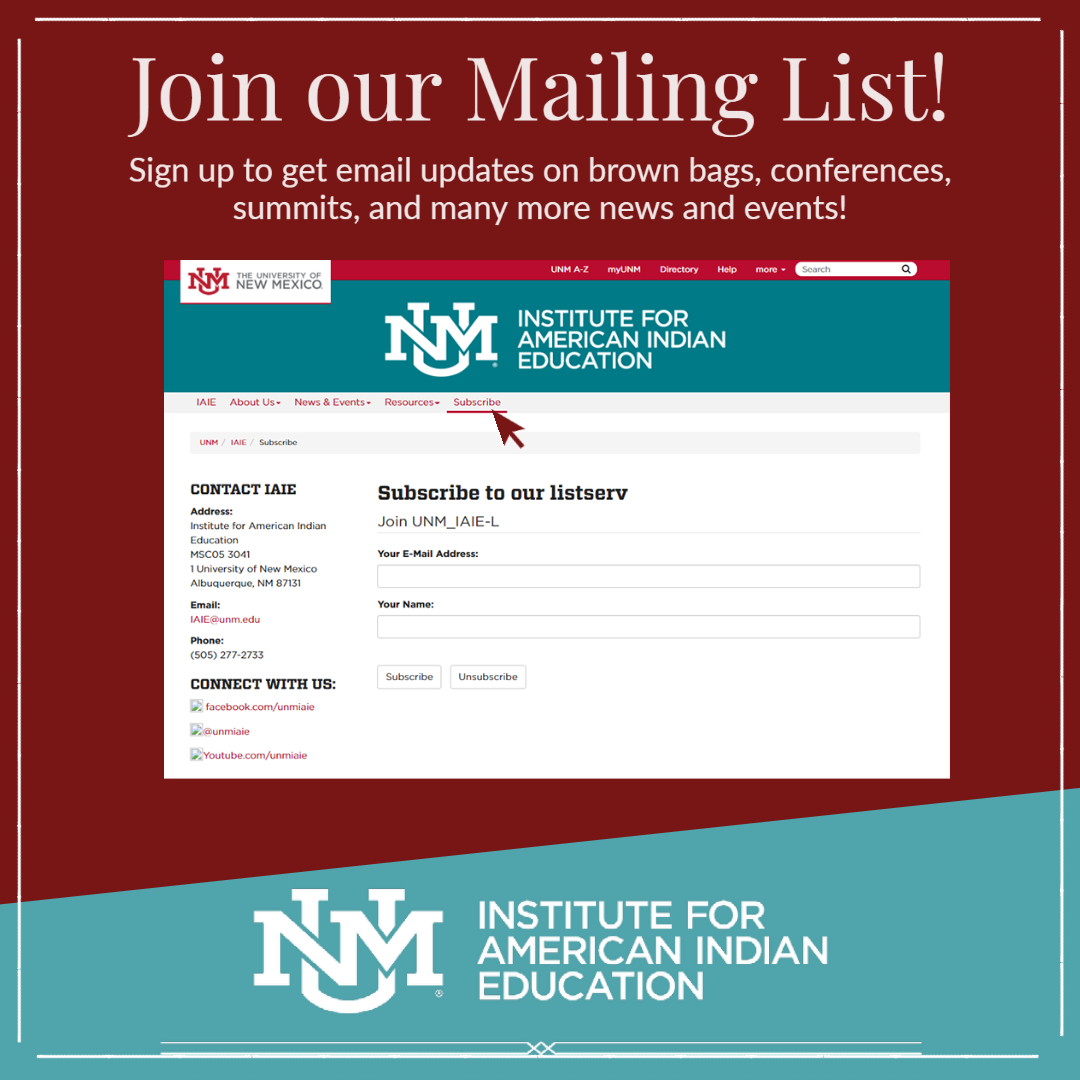CURRENTLY UNDER CONSTRUCTION
Refer to the listing below to view specific papers, panels, and workshops. Click the presentation title to read a brief abstract or click the download option if available.
Lessons learned from oil and fracking activities on Indigenous communities
David J. Tsosie
Hazel James-Tohe
Esther Yazzie-Lewis
The oil and fracking activities in the chapters of Counselor, Torreon, and Ojo Encino have had many negative impacts on the land, water, air, vegetations, animals and the people. All of these negative impacts have caused us to reflect on many of the teachings of our elders as it relates to keeping the ecological system in balance. There are many teachings that relate to living harmoniously with our environment to ensure longevity. There are also traditional stories that convey the proper way of living and some of the pitfalls that need to be avoided.
Navajo Language Revitalization: The Higher Education Perspective
Wafa Hozien, Ph.D.
Siri Tuttle, Ph.D.
Henry H. Fowler, Ed.D.
Franklin Sage, Ph.D.
Sharon Nelson
Indigenous languages rely on revitalization programs to prevent extinction. Having a language revitalization program requires the consideration of many complex factors that surround individual attitudes, identities, and beliefs. The scope of this panel presentation is to examine four factors and how they correlate a positive outcome. We present the work of the undergraduate program and graduate programs at one southwestern university and how language revitalization is supported.
Transdisciplined Approach to Embracing Indigenous Languages
Michelle R. Whitstone
The proposal is based on a critical social justice framework of TribalCrit Theory (Brayboy) with a push for transdiciplarity and critical consciousness in considering an embracing of Indigenous languages within all areas of learning institutions. While Brayboy (2002) pushes TribalCrit through marginalized lens of Indigenous peoples who continue to be suppressed by postcolonial agendas, I am proposing more of a ’how’ - a practical way of engaging an alternative, transdisciplined paradigm which can help us to seek an alternative to an overt patriarchy which continues to exploit our natural environment and its resources.
Relationship, Responsibility, Reciprocity, and Respect: Horses as teachers, lessons in relationality
Kelsey Dayle John
RM ShieldChief (Mariah)
Charlotte G. Dawson
The mutual recognition between human and animal-persons is a characteristic shared among most tribal world views. This panel discusses the relationship between human/animal beings by focusing on human/equine relations as they are relevant to Indigenous research and education. The panelists focus on the theoretical intervention of animal beings as knowers, teachers, and collaborators in education/research. Each presentations looks at a different nuance to equine communication, history, and research within Indigenous educational context.
A Recipe for Tribal Sovereignty: Ingredient #1, Education
Dr. Celia Stall-Meadows
As set forth in the 1830 Treaty of Dancing Rabbit Creek, one of the Five Civilized Tribes continues to prioritize education sovereignty for all children within the tribal jurisdiction, regardless of their race or tribal affiliation. The Summer Learning Program (SLP) is a trusted partnership between the public schools and the tribe. This paper provides an overview of the early childhood SLP, its evolution, and the program's contribution to educational sovereignty.
Transforming Diné Education: Innovations in Pedagogy and Practice
Shawn Secatero
Lorenda Belone
Tina Deschenie
Christine Vining
For this book, Transforming Diné Education: Innovations in Pedagogy and Practice, the editors invited educators, researchers, and practitioners who bring decades of teaching and leadership experience to offer their critical insights into contemporary programs that place Diné-centered pedagogy into practice. The book chapters address special education, language revitalization, wellness, self-determination and sovereignty, and university-tribal-community partnerships. These contributions foreground Diné ways of knowing both as an Indigenous centered educational philosophy and as transformative active/reflective practice to deepen our understanding of the state of Navajo education. The contributors' unique perspectives about effective teaching practices and the development of programs have great potential to advance educational opportunities for Navajo youth. This book provides stories of Diné resilience, resistance, and survival. It articulates a Diné-centered pedagogy that will benefit educators and learners for generations to come. Transforming Diné Education fills a need in the larger literature of curricular and programmatic development and provides tools for academic success for all American Indian students. Contributors to the book: Berlinda Begay, Lorenda Belone, Michael “Mikki” Carroll, Quintina “Tina” Deschenie, Henry Fowler, Richard Fulton, Davis E. Henderson, Kelsey Dayle John, Lyla June Johnston, Tracia Keri Jojola, Tiffany S. Lee, Shawn Secatero, Michael Thompson, Pedro “Pete” Vallejo, Christine B. Vining, Vincent Werito, and Duane “Chili” Yazzie
Research conducted by the 7 Generation Games investigation team concluded that teachers instructing Indigenous students needed a more targeted curriculum in order to teach Indigenous students more effectively, with a strong focus on improving math, language, attendance and engagement. Growing Math is federally funded platform that 7 Generation Games developed following these studies. This platform provides 3rd through 8th grade standards-aligned lessons with video game integration, a digital resource library, data reports, no-cost teacher training and tech support. All lessons are cross-curricular in math, Indigenous social studies or agricultural science. Through Growing Math implementation, all students can strengthen their math skills while learning Indigenous social studies, agriculture, and language through immersive video game experiences.
To describe the importance of the New Mexico School for the Blind and Visually Impaired (NMSBVI) as a resource for our Native communities. Due to many of the communities not being close to bigger cities for support for students and young adults who are visually impaired or blind, it is important to be able to have the resources and support from NMSBVI. This support can also lead to national support and local areas.
Oral language development for Tribal Language communities is core to revitalizing and preserving the cultural identity of our heritage and an essential component of literacy programs designed for second language learners. Oral language development in the native language for NM’s American Indian students is essential to revitalizing and maintaining the oral-based traditions of tribal languages and cultures. The dominance of English-speaking societies challenges native languages because of the existence preceding colonization through dominant English schooling. Oral language must be an essential component of all instructional programs designed for American Indian second language learners.
Exercising Indigenous Educational Sovereignty Through Culture-Based Education
Jon Reyhner
Joseph Martin
This paper the theme of exercising Indigenous educational sovereignty in the interest of our children through providing Culture Based Education (CRB). We look at evidence supporting transculturation theory (Huffman, 2013, 2018, 2020) that shows a strong sense of tribal identity supports academic success. In addition, we will look at research that shows the obsession with test scores found in the No Child Left Behind Act of 2001 and Every Student Succeeds Act of 2015 is misguided (Jackson, 2018, 2019) and that English-only mainstream schooling leads to a breakdown of traditional cultural values (Holm & Holm, 1990; Lee, 2022).
Developing an Indigenous Higher Education Engineering Curriculum
Wafa Hozien, Ph.D.
Peter Romine, Ph.D.
The Indigenous Engineering Higher Education research project at Navajo Technical University looks to engage Native American youth, the targeted high need demographic, in pursuing science, math, and engineering disciplines. The research aims to increase social and academic preparedness among Native students, advance collaboration with Tribal communities, and improve recruitment and retention of Native students at the university level. The objective of this research is to incorporate all components into a model that is transferrable to other Native American populations.
Diné Bina'nitin Dóó O'hoo'aah was a summer school built of, for and by Diné People. By following our traditional ceremonial planning processes, aligning with the equinoxes and solstices, about 30 Diné elders, youth, parents and children created their own summer school focused on traditional skills and philosophy. This panel will share the lessons our collective learned and the importance of community curriculum development.
Unsettling Settler Colonial Education: The Transformational Indigenous Praxis Model
Cornel Pewewardy (Comanche/Kiowa)
Anna Lees (Waganakasing Odawa descendant)
Robin Zape-tah-hol-ah Minthorn (Kiowa/Apache/Nez Perce/Umatilla/Assiniboine)
Shawn Secatero (Canoncito Band of Navajos)
Tahlia Natachu (Zuni)
Geneva Becenti (Diné)
This panel presentation will summarize and highlight selective book chapters by collaborators from the upcoming book “Unsettling Settler Colonial Education” by Teachers College Press. The proposed book talk narrative aims to offer examples of transformational action dimensions through case studies by selected collaborators from the upcoming book “Unsettling Settler Colonial Education: The Transformational Indigenous Praxis Model” published by Teachers College Press. The TIPM that frames the case studies in this book is composed of four dimensions toward decolonizing and Indigenizing teaching and learning across contexts. Collaborators will offer a brief summary of their respective book chapters of each TIPM dimension with examples of resistance educators face as they expand their critical consciousness toward social action and radical educational reform. An overview of the dimensions and resistance will be followed by recommended antidotes to the challenges faced around critical thinking and praxis.
Cuba Independent School District faced many struggles during the pandemic. As a majority of our students are Indigenous, we worked with our district, our students, and our families to find solutions to ensure our students received an equitable education. Throughout the pandemic, we discovered that many struggles our students faced went well beyond education. Regardless, we offered the assistance to our families in any aspect that we could and we feel that it was a period of growth and understanding between our district and our communities.
ZOOM HOW-TO GUIDES
Listed below are general step-by-step guides on how to enter the virtual conference by a computer or by phone and self-selecting a breakout room. The meeting link and dial-in information have been provided through a confirmation email sent prior to the conference. If during any time of the summit find yourself needing technical assistance, you may send a direct message to the following Technical Assistance list by the chat function (available to attendees participating by computer only).
Technical Assistance:
- Institute for American Indian Education (Host)
How to Join
T T
Join a meeting by computer:
Click on the link that was provided to you, it will look something like: http://unm.zoom.us/j/555555555 (this is only an example)
A dialog window will pop-up:
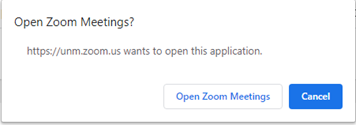
Click on “Open Zoom Meetings”
A window will pop-up, to enter your name (you can select the check-box to “Remember my name for future meetings”, after you enter your name click Join Meeting:
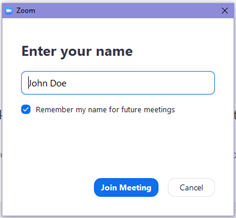
On the next window click on “Join with Computer Audio”
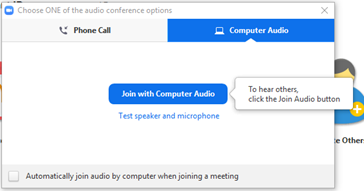
Features while you are in a meeting:
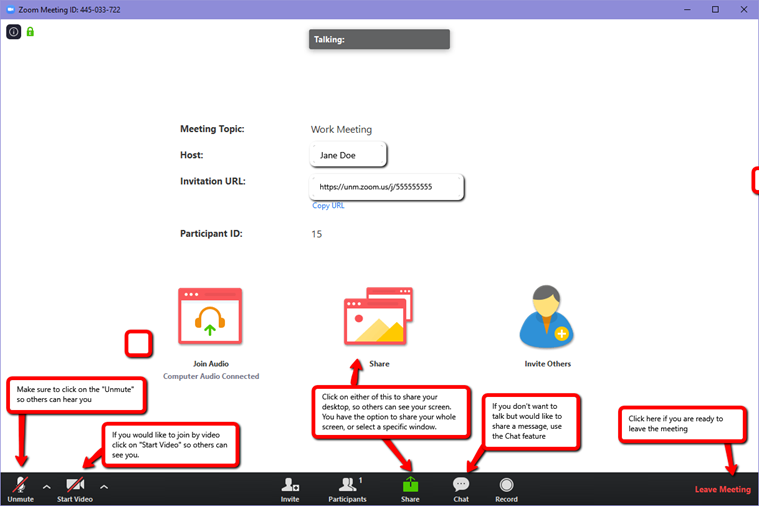
To minimize background noise, please remain on “mute” when you are not speaking.
Join a meeting by phone:
- Dial an in-country number. If you dial a toll number, your carrier rates will apply.
- You will be prompted to enter the meeting ID - the nine (9), ten (10), or eleven (11) digit ID provided to you by the host, followed by #.
- If the meeting has not already started and join before host is not enabled, you will be prompted to enter the host key to start the meeting, or to press # to wait if you are participant.
- You will be prompted to enter your unique participant ID. Press # to skip.
Phone controls for participants
The following commands can be entered via DTMF tones using your phone's dial pad while in a Zoom meeting:
- *6 - Toggle mute/unmute
- *9 - Raise hand.
Self-selecting a breakout room:
The host will allow participants to self-select and join breakout rooms of their choosing, participants will be able to view and select from a list of breakout rooms the host has created. They will be able to enter and leave breakout rooms freely.
Note: Participants not joined with the desktop or mobile app (version 5.3.0 or higher) will not be able to self-select a breakout room. The host will need to facilitate moving these participants manually.
- Click the Breakout Rooms option in your meeting controls.

This will display the list of open breakout rooms created by the host. - Click Join next to the Breakout Room you wish to participant in, then confirm by clicking Join again.
- Repeat as necessary to join other breakout rooms or click Leave Room to return to the main session.
Asking for help:
If you click Ask for Help, it will notify the meeting host that you need assistance, and they will be asked to join your breakout room.
- Click Ask for Help in the meeting controls.
![]() 2. Confirm that you would like assistance by clicking Invite Host.
2. Confirm that you would like assistance by clicking Invite Host.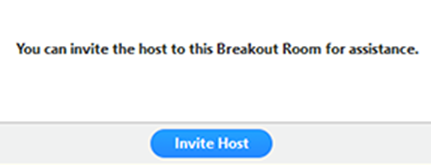
Transdisciplined Approach to Embracing Indigenous Languages
Michelle R. Whitstone
The proposal is based on a critical social justice framework of TribalCrit Theory (Brayboy) with a push for transdiciplarity and critical consciousness in considering an embracing of Indigenous languages within all areas of learning institutions. While Brayboy (2002) pushes TribalCrit through marginalized lens of Indigenous peoples who continue to be suppressed by postcolonial agendas, I am proposing more of a ’how’ - a practical way of engaging an alternative, transdisciplined paradigm which can help us to seek an alternative to an overt patriarchy which continues to exploit our natural environment and its resources.
Indigenous Education Struggles During A Pandemic
Raphaelita Phillips
Cuba Independent School District faced many struggles during the pandemic. As a majority of our students are Indigenous, we worked with our district, our students, and our families to find solutions to ensure our students received an equitable education. Throughout the pandemic, we discovered that many struggles our students faced went well beyond education. Regardless, we offered the assistance to our families in any aspect that we could and we feel that it was a period of growth and understanding between our district and our communities.
Guiding the Word Through Touch
Jenilee M. Charley
To describe the importance of the New Mexico School for the Blind and Visually Impaired (NMSBVI) as a resource for our Native communities. Due to many of the communities not being close to bigger cities for support for students and young adults who are visually impaired or blind, it is important to be ale to have the resources and support from NMSBVI. This support can also lead to national support and local areas.
Relationship, Responsibility, Reciprocity, and Respect: Horses as teachers, lessons in relationality
Kelsey Dayle John
RM ShieldChief (Mariah)
Charlotte G. Dawson
The mutual recognition between human and animal-persons is a characteristic shared among most tribal world views. This panel discusses the relationship between human/animal beings by focusing on human/equine relations as they are relevant to Indigenous research and education. The panelists focus on the theoretical intervention of animal beings as knowers, teachers, and collaborators in education/research. Each presentations looks at a different nuance to equine communication, history, and research within Indigenous educational context.
Oral language development for Tribal Language communities is core to revitalizing and preserving the cultural identity of our heritage and an essential component of literacy programs designed for second language learners. Oral language development in the native language for NM’s American Indian students is essential to revitalizing and maintaining the oral-based traditions of tribal languages and cultures. The dominance of English-speaking societies challenges native languages because of the existence preceding colonization through dominant English schooling. Oral language must be an essential component of all instructional programs designed for American Indian second language learners.
Lessons learned from oil and fracking activities on Indigenous communities
David J. Tsosie
Hazel James-Tohe
Esther Yazzie-Lewis
The oil and fracking activities in the chapters of Counselor, Torreon, and Ojo Encino have had many negative impacts on the land, water, air, vegetations, animals and the people. All of these negative impacts have caused us to reflect on many of the teachings of our elders as it relates to keeping the ecological system in balance. There are many teachings that relate to living harmoniously with our environment to ensure longevity. There are also traditional stories that convey the proper way of living and some of the pitfalls that need to be avoided.
Growing Math Supports Native Language and Culture with Tech
Christy Hanson
Research conducted by the 7 Generation Games investigation team concluded that teachers instructing Indigenous students needed a more targeted curriculum in order to teach Indigenous students more effectively, with a strong focus on improving math, language, attendance and engagement. Growing Math is federally funded platform that 7 Generation Games developed following these studies. This platform provides 3rd through 8th grade standards-aligned lessons with video game integration, a digital resource library, data reports, no-cost teacher training and tech support. All lessons are cross-curricular in math, Indigenous social studies or agricultural science. Through Growing Math implementation, all students can strengthen their math skills while learning Indigenous social studies, agriculture, and language through immersive video game experiences.
Navajo Language Revitalization: The Higher Education Perspective
Wafa Hozien, Ph.D.
Siri Tuttle, Ph.D.
Henry H. Fowler, Ed.D.
Franklin Sage, Ph.D.
Sharon Nelson
Indigenous languages rely on revitalization programs to prevent extinction. Having a language revitalization program requires the consideration of many complex factors that surround individual attitudes, identities, and beliefs. The scope of this panel presentation is to examine four factors and how they correlate a positive outcome. We present the work of the undergraduate program and graduate programs at one southwestern university and how language revitalization is supported.
Community Based Curriculum Development
Lyla Johnston
Diné Bina'nitin Dóó O'hoo'aah was a summer school built of, for and by Diné People. By following our traditional ceremonial planning processes, aligning with the equinoxes and solstices, about 30 Diné elders, youth, parents and children created their own summer school focused on traditional skills and philosophy. This panel will share the lessons our collective learned and the importance of community curriculum development.
Exercising Indigenous Educational Sovereignty Through Culture Based Education
Jon Reyhner
Joseph Martin
This paper the theme of exercising Indigenous educational sovereignty in the interest of our children through providing Culture Based Education (CRB). We look at evidence supporting transculturation theory (Huffman, 2013, 2018, 2020) that shows a strong sense of tribal identity supports academic success. In addition, we will look at research that shows the obsession with test scores found in the No Child Left Behind Act of 2001 and Every Student Succeeds Act of 2015 is misguided (Jackson, 2018, 2019) and that English-only mainstream schooling leads to a breakdown of traditional cultural values (Holm & Holm, 1990; Lee, 2022).
A Recipe for Tribal Sovereignty: Ingredient #1, Education
Dr. Celia Stall-Meadows
As set forth in the 1830 Treaty of Dancing Rabbit Creek, one of the Five Civilized Tribes continues to prioritize education sovereignty for all children within the tribal jurisdiction, regardless of their race or tribal affiliation. The Summer Learning Program (SLP) is a trusted partnership between the public schools and the tribe. This paper provides an overview of the early childhood SLP, its evolution, and the program's contribution to educational sovereignty.
Transforming Diné Education: Innovations in Pedagogy and Practice
Shawn Secatero
Lorenda Belone
Tina Deschenie
Christine Vining
For this book, Transforming Diné Education: Innovations in Pedagogy and Practice, the editors invited educators, researchers, and practitioners who bring decades of teaching and leadership experience to offer their critical insights into contemporary programs that place Diné-centered pedagogy into practice. The book chapters address special education, language revitalization, wellness, self-determination and sovereignty, and university-tribal-community partnerships. These contributions foreground Diné ways of knowing both as an Indigenous centered educational philosophy and as transformative active/reflective practice to deepen our understanding of the state of Navajo education. The contributors' unique perspectives about effective teaching practices and the development of programs have great potential to advance educational opportunities for Navajo youth. This book provides stories of Diné resilience, resistance, and survival. It articulates a Diné-centered pedagogy that will benefit educators and learners for generations to come. Transforming Diné Education fills a need in the larger literature of curricular and programmatic development and provides tools for academic success for all American Indian students. Contributors to the book: Berlinda Begay, Lorenda Belone, Michael “Mikki” Carroll, Quintina “Tina” Deschenie, Henry Fowler, Richard Fulton, Davis E. Henderson, Kelsey Dayle John, Lyla June Johnston, Tracia Keri Jojola, Tiffany S. Lee, Shawn Secatero, Michael Thompson, Pedro “Pete” Vallejo, Christine B. Vining, Vincent Werito, and Duane “Chili” Yazzie
Unsettling Settler Colonial Education: The Transformational Indigenous Praxis Model
Cornel Pewewardy (Comanche/Kiowa)
Anna Lees (Waganakasing Odawa descendant)
Robin Zape-tah-hol-ah Minthorn (Kiowa/Apache/Nez Perce/Umatilla/Assiniboine)
Shawn Secatero (Canoncito Band of Navajos)
Tahlia Natachu (Zuni)
Geneva Becenti (Diné)
This panel presentation will summarize and highlight selective book chapters by collaborators from the upcoming book “Unsettling Settler Colonial Education” by Teachers College Press. The proposed book talk narrative aims to offer examples of transformational action dimensions through case studies by selected collaborators from the upcoming book “Unsettling Settler Colonial Education: The Transformational Indigenous Praxis Model” published by Teachers College Press. The TIPM that frames the case studies in this book is composed of four dimensions toward decolonizing and Indigenizing teaching and learning across contexts. Collaborators will offer a brief summary of their respective book chapters of each TIPM dimension with examples of resistance educators face as they expand their critical consciousness toward social action and radical educational reform. An overview of the dimensions and resistance will be followed by recommended antidotes to the challenges faced around critical thinking and praxis.
Developing an Indigenous Higher Education Engineering Curriculum
Wafa Hozien, Ph.D.
Peter Romine, Ph.D.
The Indigenous Engineering Higher Education research project at Navajo Technical University looks to engage Native American youth, the targeted high need demographic, in pursuing science, math, and engineering disciplines. The research aims to increase social and academic preparedness among Native students, advance collaboration with Tribal communities, and improve recruitment and retention of Native students at the university level. The objective of this research is to incorporate all components into a model that is transferrable to other Native American populations.
